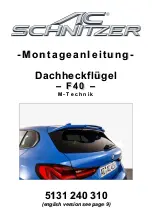
With proper use, these tires meet the highest
standards for safety and handling.
New tires
Tire traction is not optimal due to manufactur‐
ing circumstances when tires are brand-new;
they achieve their full traction potential after a
break-in time.
Drive conservatively for the first
200 miles/300 km.
Retreaded tires
The manufacturer of your vehicle does not rec‐
ommend the use of retreaded tires.
Retreaded tires
Possibly substantial variations in the de‐
sign and age of the tire casing structures can
limit service life and have a negative impact on
road safety.◀
Winter tires
Winter tires are recommended for operating on
winter roads.
Although so-called all-season M+S tires pro‐
vide better winter traction than summer tires,
they do not provide the same level of perform‐
ance as winter tires.
Maximum speed of winter tires
If the maximum speed of the vehicle is higher
than the permissible speed for the winter tires,
then a respective symbol is displayed in your
field of vision. You can obtain this sign from the
tire specialist or from your service center.
Maximum speed for winter tires
Do not exceed the maximum speed for
the respective winter tires; otherwise, tire dam‐
age and accidents can occur.◀
Run-flat tires
If you are already using run-flat tires, for your
own safety you should replace them only with
the same kind. No spare tire is available in the
case of a flat tire. Your service center will be
glad to advise you.
Rotating wheels between axles
Different wear patterns can occur on the front
and rear axles depending on individual driving
conditions. The tires can be rotated between
the axles to achieve even wear. Your service
center will be glad to advise you. After rotating,
check the tire pressure and correct if needed.
Rotating the tires is not permissible on vehi‐
cles with different tire sizes or rim sizes on the
front and rear axles.
Storage
Store wheels and tires in a cool, dry place with
as little exposure to light as possible.
Always protect tires against all contact with oil,
grease and fuels.
Do not exceed the maximum tire inflation pres‐
sure indicated on the side wall of the tire.
Run-flat tires
Label
RSC label on the tire sidewall.
The wheels consist of tires that are self-sup‐
porting, to a limited degree, and possibly spe‐
cial rims.
The support of the sidewall allows the tire to
remain drivable to a restricted degree in the
event of a tire inflation pressure loss.
Seite 205
Wheels and tires
Mobility
205
Online Edition for Part no. 01 40 2 954 231 - II/15
Summary of Contents for 6 SERIES -
Page 2: ......
Page 8: ......
Page 15: ...Notes 11 Online Edition for Part no 01 40 2 954 231 II 15...
Page 16: ...Online Edition for Part no 01 40 2 954 231 II 15...
Page 36: ...Online Edition for Part no 01 40 2 954 231 II 15...
Page 180: ...Online Edition for Part no 01 40 2 954 231 II 15...
Page 193: ...Saving fuel Driving tips 189 Online Edition for Part no 01 40 2 954 231 II 15...
Page 194: ...Online Edition for Part no 01 40 2 954 231 II 15...
Page 237: ...Care Mobility 233 Online Edition for Part no 01 40 2 954 231 II 15...
Page 238: ...Online Edition for Part no 01 40 2 954 231 II 15...
Page 243: ...Technical data Reference 239 Online Edition for Part no 01 40 2 954 231 II 15...
Page 254: ......
















































